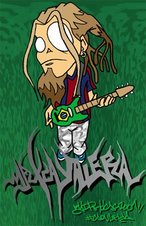
Whatever would Robert have said?
I am the suck of air you take
that you've had many times before;
I am the blow you try to fake,
but which still throws you out the door;
I am the air that fills your lungs,
but leaves you emptier below;
I am the void that you can't explain,
but which is where you want to go.
Flame sucks between the balls of steel;
nothing moves, the air itself congeals.
Look at the flame if you want to,
hear the sharp crack of the fission,
smell the brief vapour of ozone,
feel static motion.
I am the love you try to hide,
but which all can understand;
I am the hate you still deny,
though the blood is on your hands;
I am the peace you're searching for,
but you know you'll never find;
I am the pain you can't endure,
but which tingles in your mind.
Flame sucks between the balls of steel;
nothing moves, the air itself congeals.
Look at the flame if you want to,
hear the sharp crack of the fission,
smell the brief vapour of ozone,
feel static motion.
I am the joy you really pay for,
but which comes completely free;
I am your god on the final day,
for the truth is you and me...
After the flood
Continuing the story, humanity stumbles--
gone is the glory, there's a far distant rumble.
The clouds have gathered and exploded now:
axes shattered, there is no North or South!
Far off, the ice is foundering slowly...
the ice is turning to water.
The water rushes over all,
cities crash in the mighty wave;
the final man is very small,
plunging in for his final bathe.
This is the ending of the beginning...
this is the beginning of the end,
middle of the middle, mid-point, end and start:
the first peak rises, forces the waves apart.
Far off, the ice is now re-forming:
poles are fixed once more,
water's receding, like death-blood.
And when the water falls again,
all is dead and nobody lives.
And then he said:
'Every step appears to be the unavoidable consequence of the
preceding one, and in the end there beckons more and more
clearly total annihilation!'
This is the ending of the beginning...
this, the beginning of the end.
And when the water falls again
all is dead and nobody lives....
"Whatever would Robert have said?" seems to refer to the dependence of man to nature, which he/she ignores. "After the flood" describes an atmosphere of doom, which coincides remarkably with the current situation of climate change, melting of the poles ice caps, and fear for wide range meteorological upheaval.
There is a very interesting review by Steven McDonald in allmusic, which sais that:
Peter Hammill has always had an abiding interest, it seems, in the blurred boundary between the mystical and the scientific, and between the rational and magical mind; this is certainly evident on the debut Van Der Graaf Generator album, even though Hammill had yet to really begin focusing himself on what it was that was driving him (...) Hammill's lyrics, delivered with all the passion and intent he can muster, reference mysticism, numerology, astrology, various religious pantheons, the Malleus Maleficarum (leading Hammill to conclude, a bit too hopefully, that magic needs to be gray to be balanced), Robert van deGraaf himself (in "Whatever Would Robert Have Said?"), the future of humanity, and surviving ecological catastrophe. This being the start of the 1970s, the hopeful notes are drowned out by the tidal wave of fear, sadness, and despair, despite which, the music does tend to be rather uplifting, thanks to the undercurrent of barely restrained majesty VDGG tended to have (possibly thanks to Hugh Banton, who had been rather used to communicating with God via church and cathedral organs; he brought that expertise to a position more normally occupied by determined B3 thumpers engaged in battle with show-horse guitarists).
McDonald's review in allmusic
For an impression of what "Whatever would Robert have said?" souns like, there is an interesting video at youtube
05 September, 2007
Van Der Graaf Generator - Whatever would Robert have said? - After the Flood - Album: The Least We Can Do Is Wave to Each Other 1970
Αναρτήθηκε από
candiru - stratis aigaiopelagitis
στις
11:31 AM
![]()
Ετικέτες 70s decade, progressive rock, Van der Graaf Generator
Subscribe to:
Post Comments (Atom)




1 comment:
the lyrics of the first song are quite obscure, but in a free interpretation, comes to our mind the ignored dependance of human and nature, and it's strength which is impressively performed when we watch the experimental electrical machinery Van der Graaf Generator in action.
I am the joy you really pay for,
but which comes completely free;
I think that the above quoted words reflect the current condition where man was forced to pay for things that in past times were offered free by nature
Post a Comment